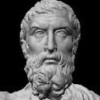Is God willing to prevent evil, but not able? then is he impotent. Is he able, but not willing? then is he malevolent. Is he both able and willing? whence then is evil?
Epicurus (341-270 BC) Greek philosopher
(Attributed)
"Epicurus' old riddle," in David Hume (1711-1776), Dialogues Concerning Natural Religion, Part X (1779). Full text. It is not found in Epicurus' surviving works. Discussion.Variants:
- "Either God wants to abolish evil, and cannot; Or he can, but does not want to; Or he cannot and does not want to. If he wants to, but cannot, he is impotent. If he can, but does not want to, he is wicked. But, if God both can and wants to abolish evil, then how come evil is in the world?"
- "Is God willing to prevent evil, but not able? Then he is not omnipotent.
Is he able, but not willing? Then he is malevolent.
Is he both able and willing? Then whence cometh evil?
Is he neither able nor willing? Then why call him God?"
Quotations by:
Epicurus
And is it possible, Cleanthes, said Philo, that after all these reflections, and infinitely more, which might be suggested, you can still persevere in your Anthropomorphism, and assert the moral attributes of the Deity, his justice, benevolence, mercy, and rectitude, to be of the same nature with these virtues in human creatures? His power we allow is infinite: whatever he wills is executed: but neither man nor any other animal is happy: therefore he does not will their happiness. His wisdom is infinite: he is never mistaken in choosing the means to any end: but the course of Nature tends not to human or animal felicity: therefore it is not established for that purpose. Through the whole compass of human knowledge, there are no inferences more certain and infallible than these. In what respect, then, do his benevolence and mercy resemble the benevolence and mercy of men?
Epicurus (341-270 BC) Greek philosopher
(Attributed)
In David Hume (1711-1776), Dialogues Concerning Natural Religion, Part X (1779). Full text. Not found in the surviving writings of Epicurus.
This immediately precedes Epicurus' Old Riddle.
It is possible to provide security against other ills, but as far as death is concerned, we men live in a city without walls.
Epicurus (341-270 BC) Greek philosopher
The Vatican Collection of Epicurean Sayings [Sententiae Vaticanae], #31
(Source)
Alt. trans.: "One can attain security against other things, but when it comes to death all men live in a city without walls."

